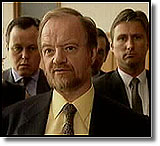
|
Cook Takes Democracy Message to CroatiaThe Foreign Secretary, Robin Cook, is moving on from Bosnia to Croatia -- spreading his message that the future lies with democracy and a free media. Mr Cook is particularly keen to urge President Tudjman to support fully the Dayton peace process.Mr Cook is meeting opposition politicians in the Bosnian city of Banja Luka; he will be making the point that all points of view are of interest, not just those of the people in control at present. He's then giving interveiws to independent local television stations and to a Belgrade radio station which is not government-controlled. The Foreign Secretary then flies on to the Croatian capital Zagreb, where he again meets opposition leaders, talks to local representatives of international organisations and gives interviews to papers, radio and television. Only then is he meeting the foreign minister, Marte Granic and, later in the evening, President Tudjman. He will be stress to Croatia's president that the success of the peace process in Bosnia depends on the co-operation of the Zagreb Government. In particular he thinks trade between Bosnia and Croatia should be made easier, with relaxations on border controls as a first step.
The Foreign Secretary, Robin Cook, spent yesterday meeting political leaders in Bosnia to urge greater efforts in implementing the Dayton peace accord.
|

|
| Izetbegovic: Promise to look into corruption claims |
While in Sarajevo he also discussed corruption. At the weekend Mr Cook said not all the aid for Bosnia was reaching its intended destinations.
The chairman of the Bosnian presidency, Alija Izetbegovic, asked for evidence and said a commission would be set up to investigate the allegation.
Related sites
External sites are not endorsed by the BBC
Office of the High Representative in Bosnia
International Criminal Tribunal for the former Yugoslavia
NATO operations in Bosnia
Diana, Princess of Wales, 1961-1997
Conference 97
Devolution
The Archive
News |
Issues |
Background |
Parties |
Analysis |
TV/Radio/Web
Interactive |
Forum |
Live |
About This Site
News |
Issues |
Background |
Parties |
Analysis |
TV/Radio/Web
Interactive |
Forum |
Live |
About This Site
© BBC 1997 |
politics97@bbc.co.uk |
